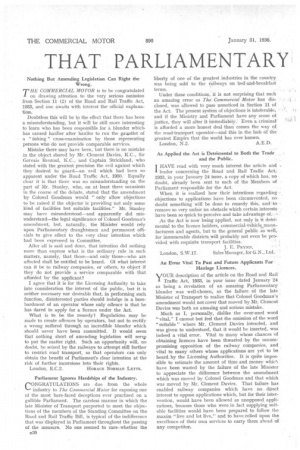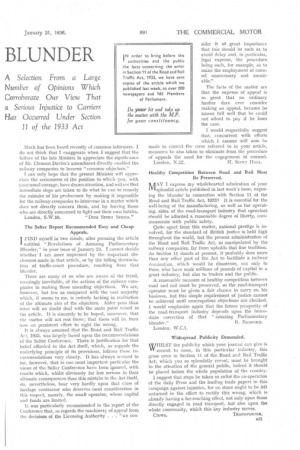THAT PARLIAMENTARY BLUNDER
Page 40

Page 41

If you've noticed an error in this article please click here to report it so we can fix it.
Nothing But Amending Legislation Can Right the Wrong.
THE COMMERCIAL MOTOR is to be congratulated on drawing attention to the very serious omission from Section 11 (2) of the Road and Rail Traffic Act, 1933, and one awaits with interest the official explanation.
Doubtless this will be to the effect that there has been a misunderstanding, but It will be still more interesting to learn who has been responsible for a blunder which has caused haulier after haulier to run the gauntlet of a "fishing" cross-examination by those representing persons who do not provide comparable services.
Mistake there may have been, but there is no mistake in the object shared by Mr. Clement Davies, K.C., Sir Gervais Rentoul, KC., and Captain Strickland, who stated with the greatest precision the evil against which they desired to guard—an evil which had been so apparent under the Road Traffic Act, 1930. Equally clear it is that there was no misunderstanding on the part of Mr. Stanley, who, on at least three occasions in the course of the debate, stated that the amendment by Colonel Goodman would "only allow objections to be raised if the objector is providing not only some kind of facilities but suitable facilities." Mr. Stanley may have misunderstood—and apparently did misunderstand—the legal significance of Colonel Goodman's amendment, but, naturally, the Minister would rely upon Parliamentary draughtsmen and permanent officials to give effect to the very clear intention which had been expressed in Committee.
After all is said and done, that intention did nothing more than express what is the ordinary rule in such matters, namely, that those—and only those—who are affected shall be entitled to be heard. Of what interest can it be to railway companies, or others, to object if they do not provide a service comparable with that afforded by the applicant?
I agree that it is for the Licensing Authority to take into consideration the interest of the public, but it is neither necessary nor desirable that, in performing such function, disinterested parties should indulge in a bombardment of an operator whose only offence is that he has dared to apply for a licence under the Act.
What is to be the remedy? Regulaticins may be made to create offences by operators, but not to rectify a wrong suffered through an incredible blunder which should never have been committed. It would seem that nothing short of amending legislation will serv„p to put the matter right. Such an opportunity will, no doubt, be seized by the railways to attempt still further to restrict road transport, so that operators can only obtain the benefit of Parliament's clear intention at the risk of further incursions into their rights.
London, E.C.2. HORACE NORMAN LETTS.
Parliament Ignores Hardships of the Industry.
CONGRATULATIONS are due from the whole industryto The Commercial Motor for exposing one of the most bare-faced deceptions ever practised on a gullible Parliament. The careless manner in which the late Minister of Transport purported to meet the objections of the members of the Standing Committee on the Road and Rail Traffic Bill, is typical of the indifference that was displayed in Parliament throughout the passing of the measure. No one seemed to care-whether the
B30 liberty of one of the greatest industries in the country, was being sold to the railways on bed-and-breakfast terms.
Under these conditions, it is not surprising that such an amazing error as The. Commercial Motor has disclosed, was allowed to pass unnoticed in Section 11 of
the Act. The present system of objections is intolerable, t) and if the Ministry and Parliament have any sense of justice, they will alter it immediately. Even a criminal
is afforded a more honest deal than comes -the way of
the road-transport operator—and this in the hub of the greatest Empire that the world has ever known.
London, N.2. A.E.D.
As Applied the Act is Detrimental to Both the Trade and the Public.
I HAVE read with very much interest the article and .
leader concerning the Road and Rail Traffic Act. 1933, in your January 24 issue, a copy of which has, no doubt, already been sent to each of the Members of Parliament responsible for the Act.
When it is realized how their intentions regarding objections to applications have been circumvented, no doubt something will be done to remedy this, and to remove so very unfair an obstacle which certain interests': have been so quick to perceive and take advantage of.,
As the Act is now being applied, not only is it detrimental to the licence holders, commercial-vehicle manufacturers and agents, but to the general public as well, for innumerable districts will probably not even be provided with requisite transport facilities.
J. E. PRYNN, 'London, S.W.17. Sales Manager, for G.N., Ltd.
An Error Vital To Past and Future Applicants For Haulage Licences.
VOUR description of the article on the Road and Rail I Traffic Act, 1933, in your issue dated January 24 as being a revelation of an amazing Parliamentary blunder was well-chosen, as the failure of the late Minister of Transport to realize that Colonel Goodman's amendment would not cover that moved by Mr. Clement Davies was both an amazing and serious mistake.
Much as I, personally, dislike the over-used word. "vital," I cannot but feel that the omission of the word " suitable " where Mr. Clement Davies intended, and was given to understand, that it would be inserted, was indeed a vital error. Vital to many whose chances of obtaining licences have been thwarted by the uncompromising opposition of the railway companies, and vital to many others whose applications are yet to be heard by the Licensing Authorities. It is quite impossible to estimate the amount of time and money which have been wasted by the failure of the late Minister to appreciate the difference between the amendment which was moved by Colonel Goodman and that which was moved by Mr. Clement Davies. That failure has enabled railway companies which have no direct interest to oppose applications which, but for their intervention, would have been allowed as unopposed applications, because those who were in fact supplying suitable facilities would have been prepared to follow the maxim "live and let live," and to have relied upon the excellence of their own services to carry them ahead of any competitor.
Much has been heard recently of common informers. I do not think that I exaggerate when I suggest that the failure of the late Minister to appreciate the significance of Mr. Clement Davies's amendment directly enabled the railway companies to become "common objectors.'' I can only hope that the present Minister will appreciate the seriousness of the position to which you, with your usual courage, have drawn attention, and will see that immediate steps are taken to do what he can to remedy the mistake of his predecessor by making it impossible for the railway companies to intervene in a matter which does not directly concern them, and by leaving those who are directly concerned to fight out their own battles.
London, S.W.16. "Dum SPIRO SPERO."
The Salter Report Recommended Easy and Cheap Appeals.
I FIND myself in two minds, after perusing the article entitled "Revelations of Amazing Parliamentary Blender," in your issue of January 24. I cannot decide whether I am more impressed by the important disclosures made in that article, or by the telling denunciation of traffic-court procedure, resulting from that blunder.
There are many of us who are aware of the trend, seemingly inevitable, of the actions of the railway companies in making these unending objections. We are, however, but few as compared with the vast majority which, it seems to me, is entirely lacking in realization of the ultimate aim of the objectors. Abler pens than mine will no doubt deal with the main point raised in the article. It is sincerely to be hoped, moreover, that the matter will not rest there; that there will be from now on persistent effort to right the wrong.
It is always assumed that the Road and Rail Traffic Act, 1933, was largely based upon the recommendations of the Salter Conference. There is justification for that belief afforded in the Act itself, which, as regards the underlying principle of its provisions, follows those recommendations very closely. It has always seemed to me, however, that in one most important particular the views of the Salter Conference have been ignored, with results which, whilst obviously far less serious in their ultimate consequences than this mistake in the Act itself, do, nevertheless, bear very hardly upon that class of haulage contractor who deserves most consideration in this respect, namely, the small operator, whose capital and funds are limited.
It was particularly recommended in the report of the Conference that, as regards the machinery of appeal from the decisions of the Licensing Authority . . . "we con sider it of great importance that this should be such as to avoid delay and, in particular, legal expense, the procedure being such, for example, as to make the employment of counsel unnecessary and unsuitable."
The facts of the matter are that the expense of appeal is so great that no ordinary haulier dare ever consider making an appeal, because he knows full well that he could not afford to pay if he loses the case.
would respectfully suggest that, concurrent with efforts which I assume will now be made to correct the error referred to in your article, measures be also taken to eliminate from the procedure of appeals the need for the engagement of counsel.
London, N.22. H. SCOTT HALL,
Healthy Competition Between Road and Rail Must Be Preserved.
MAY I express my wholehearted admiration of your splendid article published in last week's issue, exposing the blunder in connection with Section 11 of the Road and Rail Traffic Act, 1933? It is essential for the well-being of the manufacturing, as well as the operating, sides of the road-transport industry that operators should be afforded a reasonable degree of liberty, commensurate with public safety.
Quite apart from this matter, national prestige is involved, for the standard of British justice is held high throughout the world, but the present administration of the Road and Rail Traffic Act, as manipulated by the railway companies, far from upholds that fine tradition. As Section 11 stands at present, it probably does more than any other part of the Act to facilitate a railway dominat:on, which would be disastrous, not only to those who have sunk millions of pounds of capital in a great industry, but also to traders and the public.
A reasonable measure of healthy competition between road and rail must be preserved, so the road-transport operator roust be given a fair chance to carry on his business, but this simple requirement of justice cannot be achieved until unscrupulous objections are checked. I would emphasize again that the future prosperity of the road-transport industry depends upon the immediate correction of that " amazing Parliamentary blunder." R. BEDFORD. London, W.C.1.
Widespread Publicity Demanded.
WHILST the publicity which your journal can give is IT second to none, in this particular industry, this gross error in Section 11 of the Road and Rail Traffic. Act, which you so splendidly reveal, must be brought to the attention of the general public, indeed it should be placed before the whole population of the country.
I suggest that steps be taken to enlist the co-operation of the daily Press and the leading trade papers in this campaign against injustice, for no stone ought to be left unturned in the effort to rectify this wrong, which is already having a far-reaching effect, not only upon those directly engaged in road transport, but also upon the whole community, which this key industry serves.
Crewe. TRANSPORTER.




















































































